Share your garden with us
July 27th, 2018
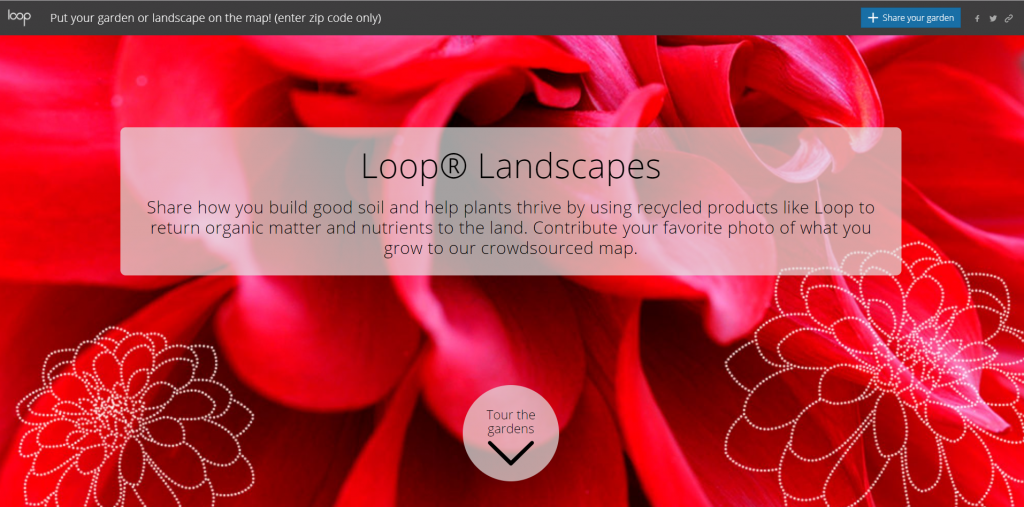
This heat! We don’t know about your garden, but our gardens are bursting with life. At the Brightwater garden and CitySoil Farm, compost made with Loop helps the soil hold water to keep our thirsty plants happy. Our gardens stay lush even during the hottest weeks of the year.
We aren’t the only ones who can’t get enough of all this beauty. Celebrate this summer with us by sharing what you’ve grown on our crowd sourced map. As long as you’re building good soil and growing lush gardens, crops, and forests, we want to see it (even if you don’t use Loop)!
To protect your privacy, please enter your zip code only when you add your photo to the map.
Photos take ~24 hours to post publicly.
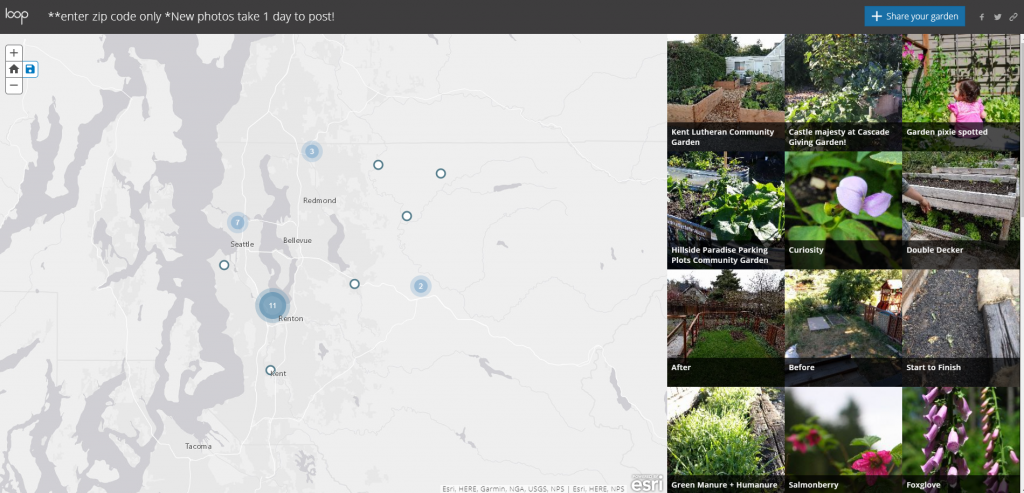
DIY Recycled Bottle Hanging Planter
February 6th, 2018
Most of the time the biosolids team tries to “DIY” (do it yourself) we end up with #pinterestfails. Perhaps we should stick to our day jobs – making sure Loop® gets to our customers so they can build good soil and grow lush fields and forests. But we’re human, and so occasionally, we get the urge to craft.
Every year for the Northwest Flower and Garden Show, Loop has a booth. We see more than 10,000 happy gardeners over 5 days. We pride ourselves on showcasing Loop’s endlessly renewable power to grow beautiful things. This means our communications project manager is always on the lookout for a good demonstration project for the booth. Almost every year, the project takes many, many more hours than anticipated and we all vow to pick an easier project the next year. And the next year. And the next.
This year, we found a stunning winner worthy of sharing with you. It not only uses recycled products (which we love), but it was easy to make. Here was our original inspiration, and below you will find our step by step DIY guide.
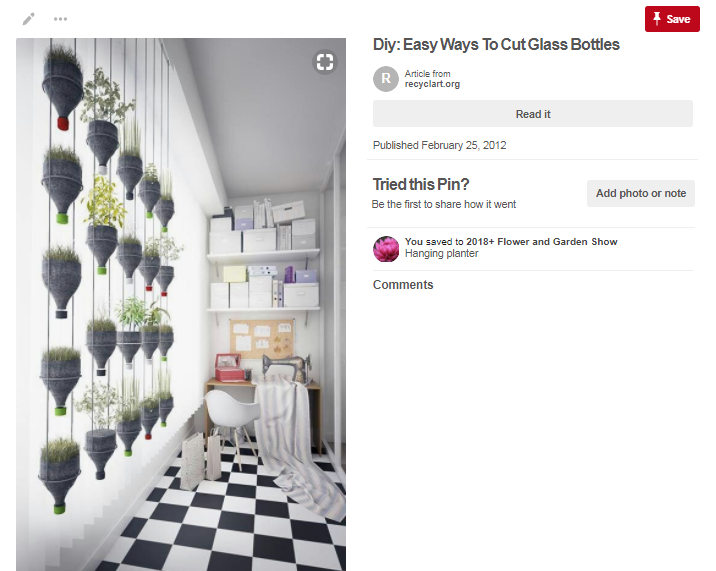
*Note* Plant roots don’t like being exposed to light. This planter works best as temporary decor, otherwise you will need to paint the exterior of the plastic bottles an opaque color so light cannot shine through.
Materials list
- Plastic bottles with caps (washed clean, labels removed)
- Heavy duty string or twine
- A thin metal awl or similar tool
- Box cutter
- Scissors
- Drill and drill bits
- Gloves
- Garden trowel
- Potting mix (we mixed in GroCo compost made with Loop)
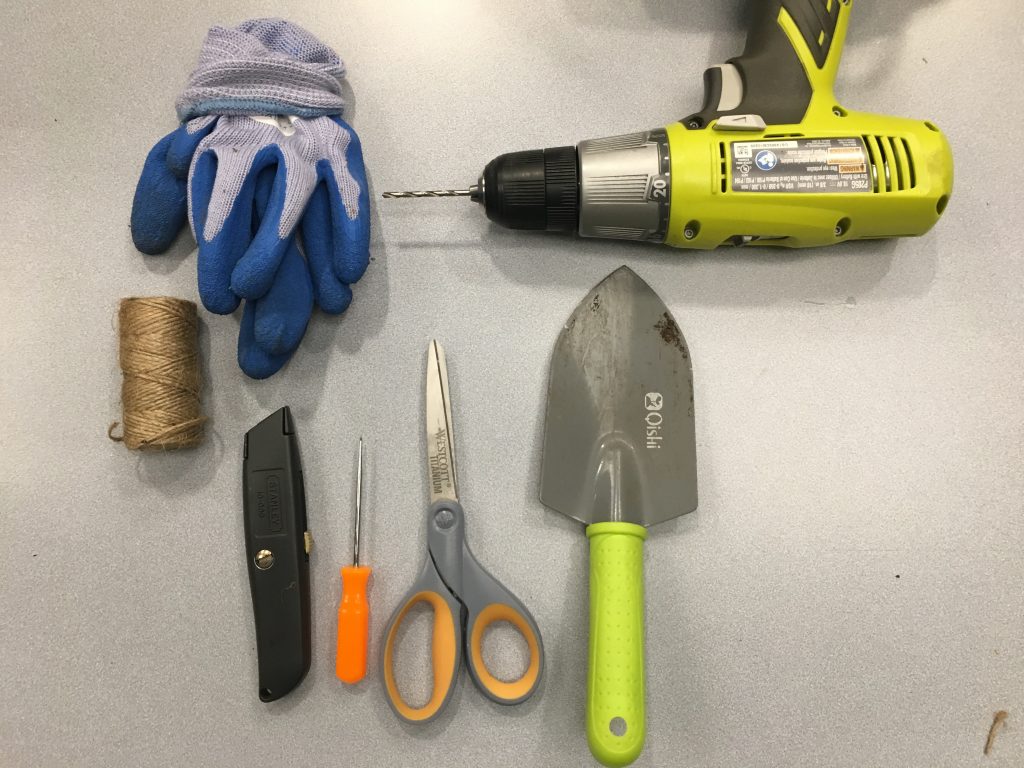
Step 1 Prepare the plastic bottles
- Wear gloves to protect your hands from sharp objects.
- Cut the bottles roughly in half using the box cutter. You will use the top half with the cap. Recycle the discarded bottom half.
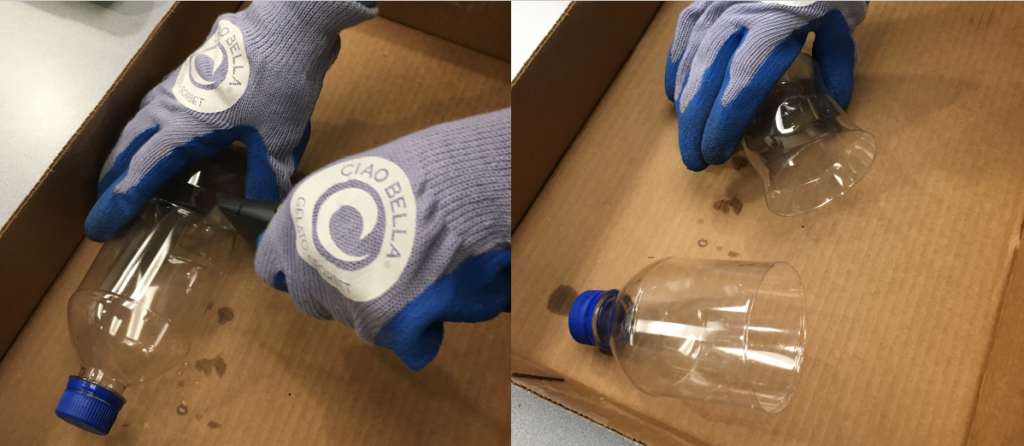
- Use the awl to poke two holes on opposite sides the bottle, about 1/2 inch from the rim of the bottle.
- Remove the cap. Place the cap on wooden board or a surface you don’t mind drilling though. Place the cap so the rim of the cap is facing up, towards you. Drill a hole through the cap so water will drain. (Note* If you do not want to place a dish under the bottom bottle to collect water, do not a drill a hole in this cap. All the bottles above it will drain into this bottle, so use larger bottle and fill it 1/3 of the way with small rocks, and then put in the soil and the plant. Since there’s no drainage, select a plant that doesn’t mind having wet roots.)
- Screw the cap back on the bottle.
- Repeat with remaining bottles.
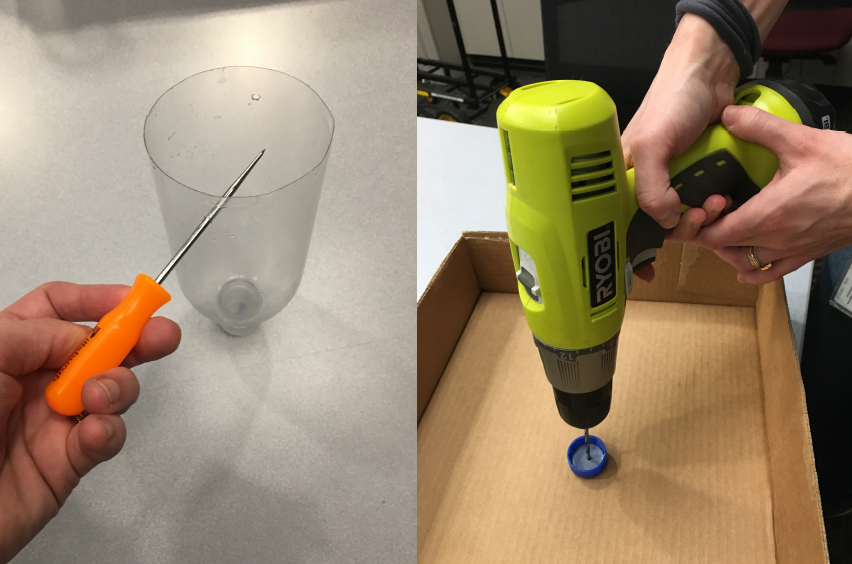
Step 2 String the planters
- Our inspiration had a sturdy metal frame – we didn’t have time for that. We used sisal twine, but this was a mistake. We recommend string that is stronger and more durable.
- Cut a long piece of string, double the length you need, with extra room for knots (and mistakes).
- Thread each end of the string through the holes for the bottle you’d like as the bottom bottle.
- Thread each side’s string through the holes for the next bottle and tie to secure in place, until you have the number of bottles you’d like (we did 3-6 bottles).
- Leave extra string at the top so you can hang your planter.
- Repeat until you have the number of hanging planters you’d like.
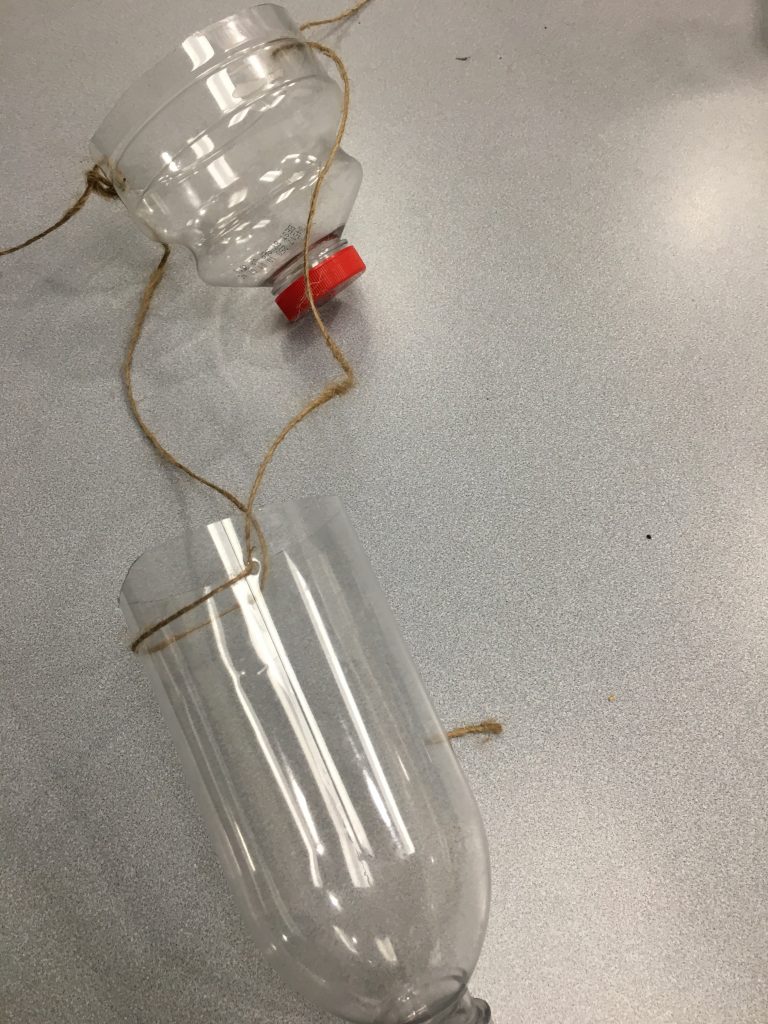
Step 3 Add the plants
- Use the garden trowel and add a little potting mix to the planter. Good potting mix with high quality compost will help the soil hold moisture like a sponge and provide slow release nutrients to feed your plants.
- Carefully slide the plant from its nursery pot, and gently shake the potting soil from its roots.
- Place the plant in the planter.
- Add potting mix around the plant, but leave a little room between the rim of the bottle and the top of the soil so you can water the plant easily.
- Water each plant.
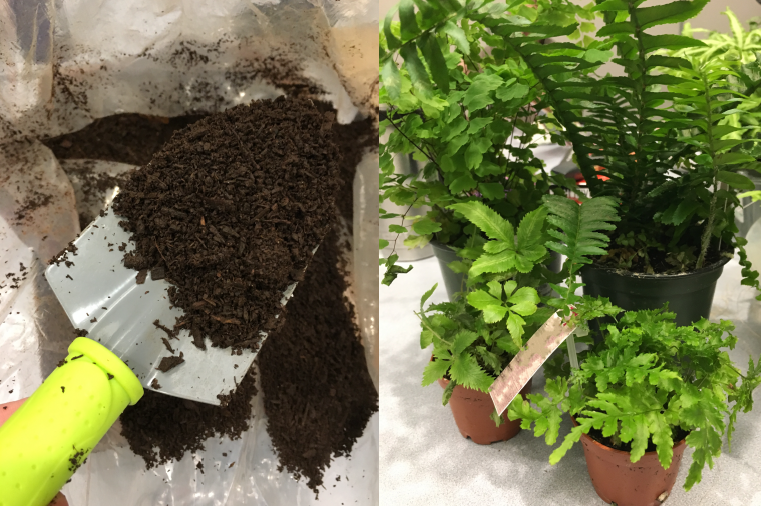
Step 4 Hang the planter
- Pick a sunny spot, and hang your planter.
Step 5 Enjoy!
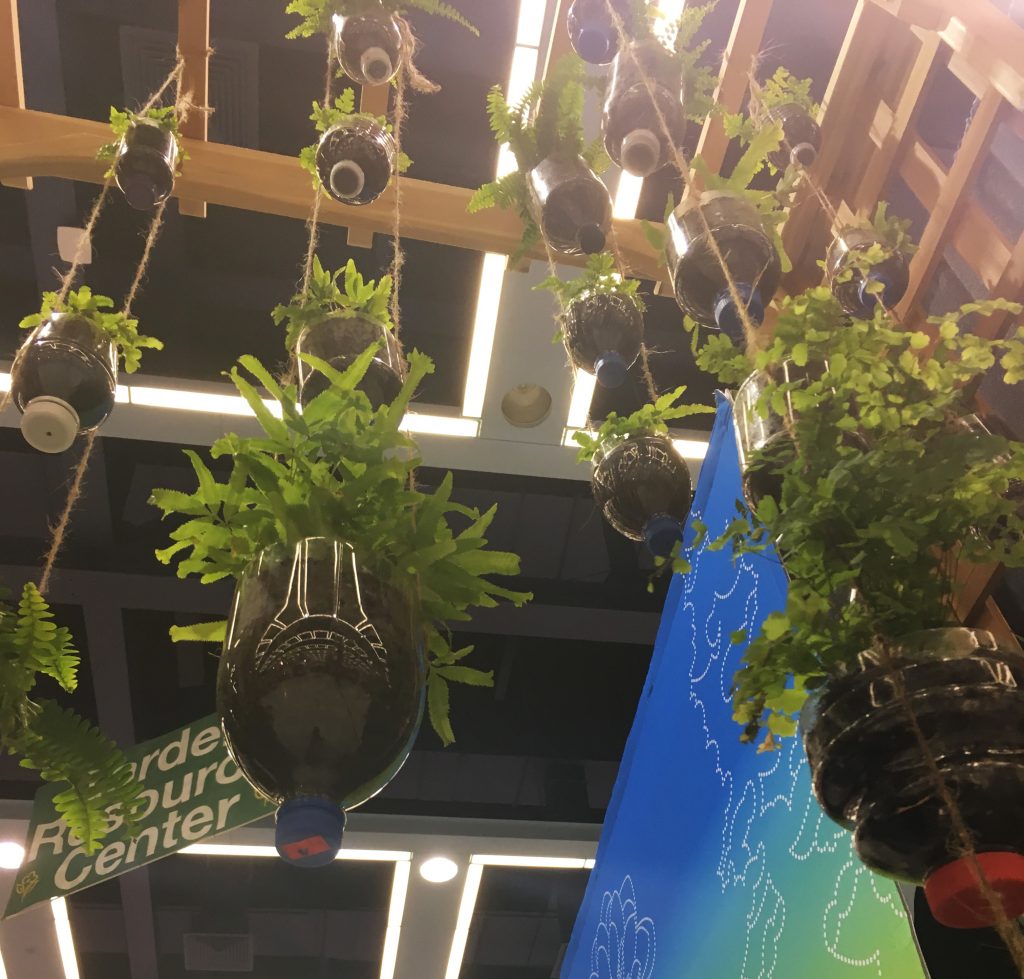
Loop Landscapes Photo Contest
January 24th, 2018
Check out the top winners of our 2018 Loop Landscapes photo contest!
1st place Overall
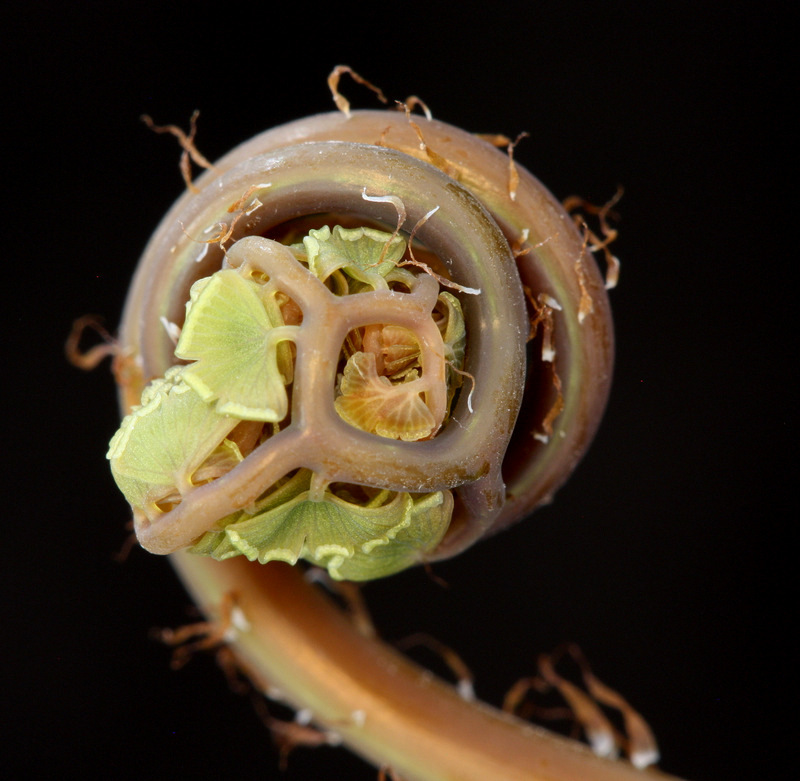
Maidenhair Fern – Submitted by Christy S.
1st place “Mesmorizing Macro”
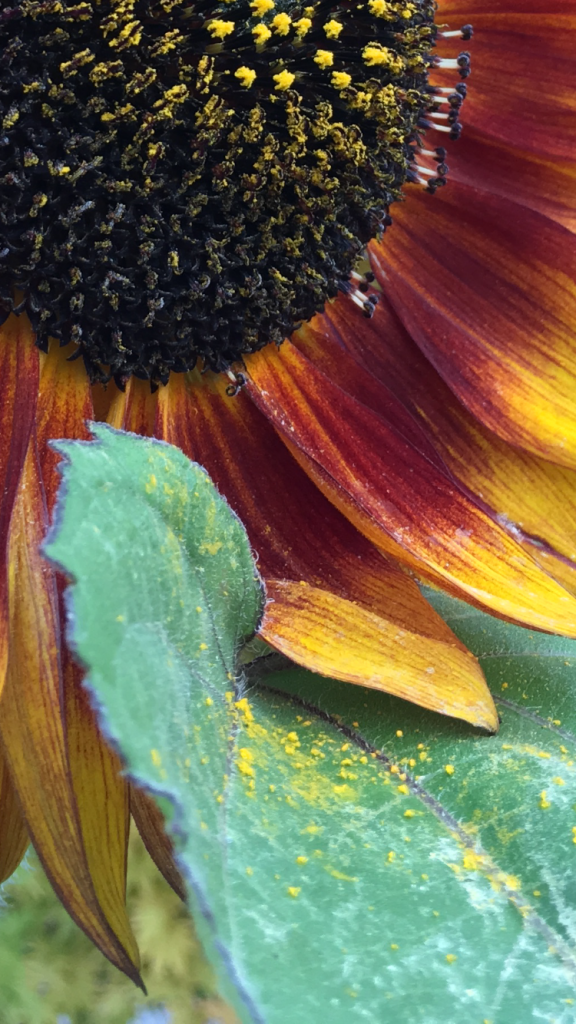
Sunflower Dust – Submitted by Elizabeth L.
1st place “Soil and Seedlings and First Signs of Spring”
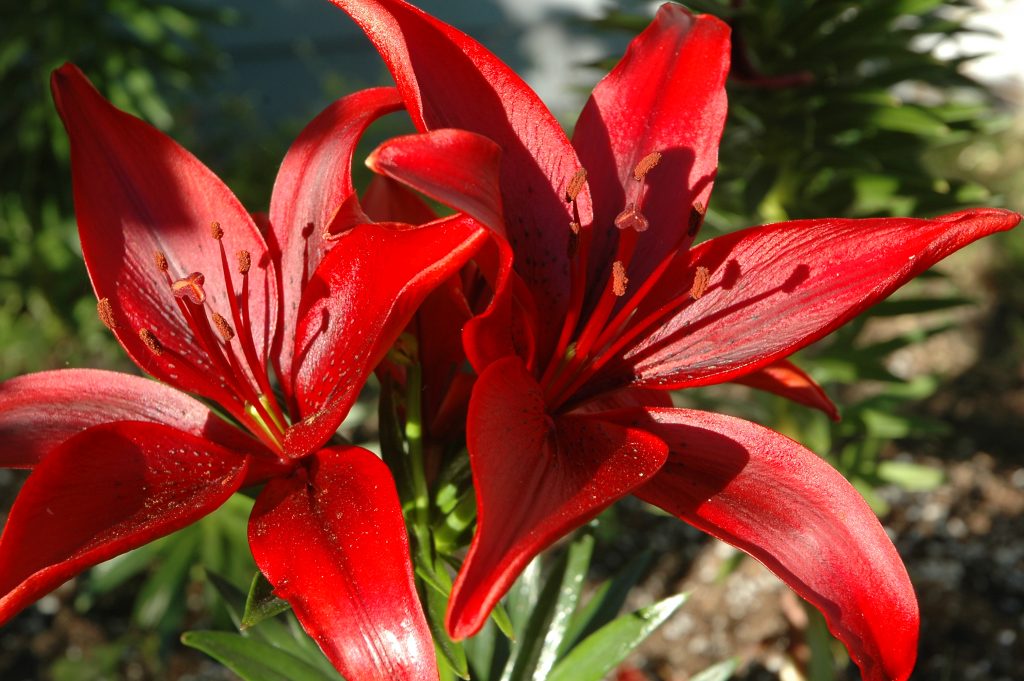
Blood Lilies – Submitted by Fedora W.
1st place “Flourishing Fauna”
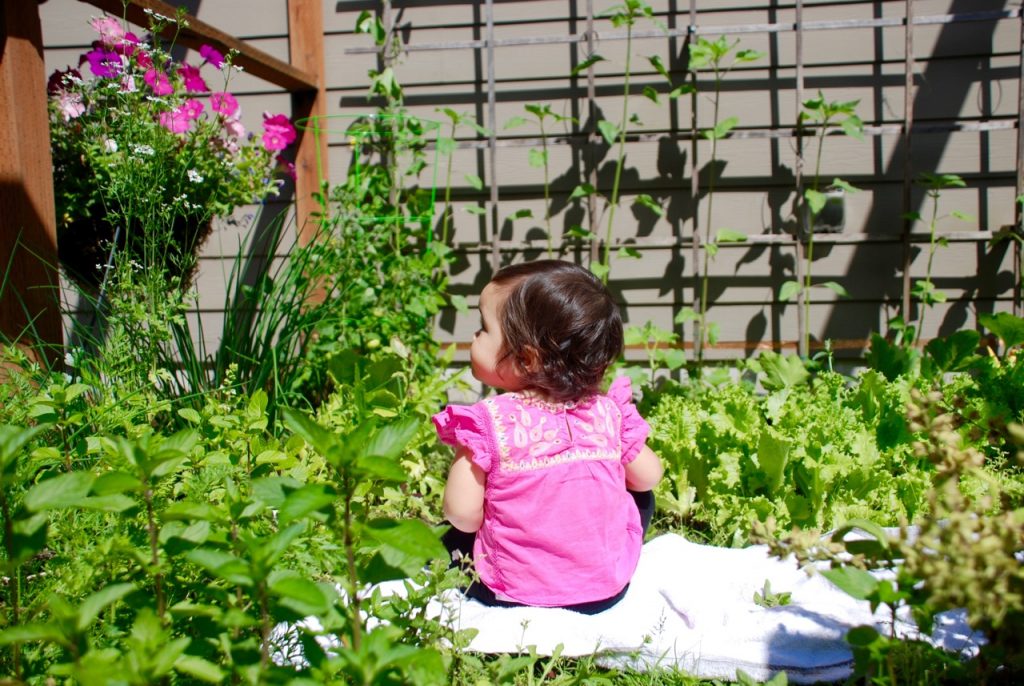
Garden Pixie (Humans can be fauna) Submitted by Maile L.B.
1st place “Lush Landscapes”
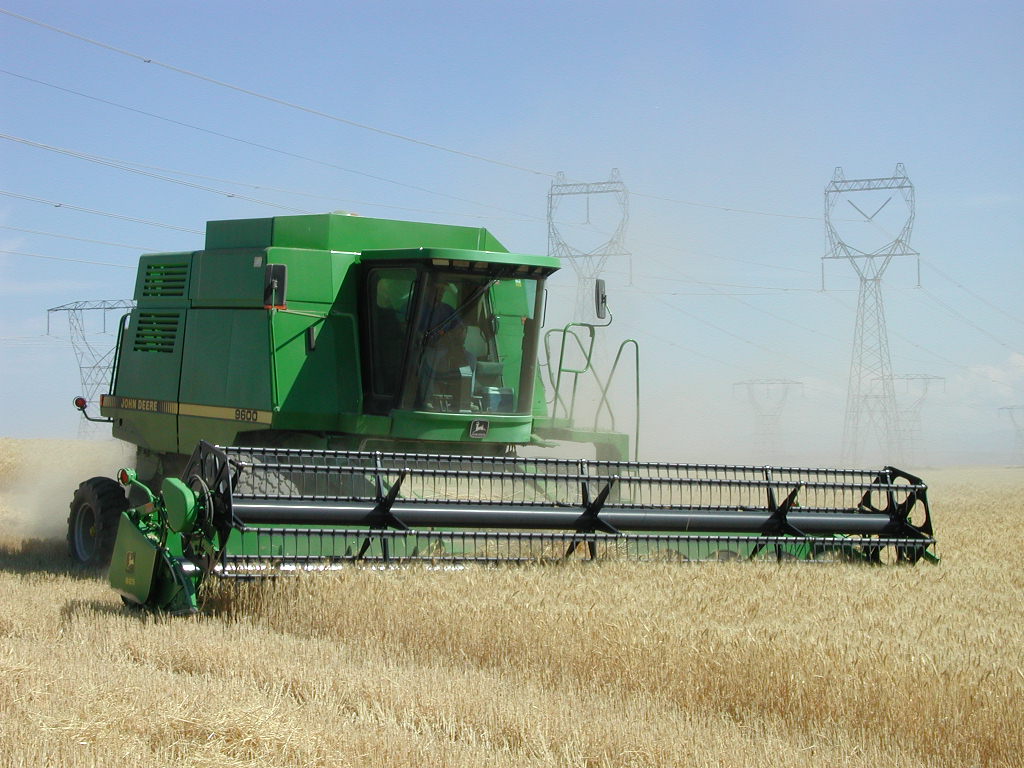
Wheat Harvest – Submitted by Andy B.
1st place “People and Plants”
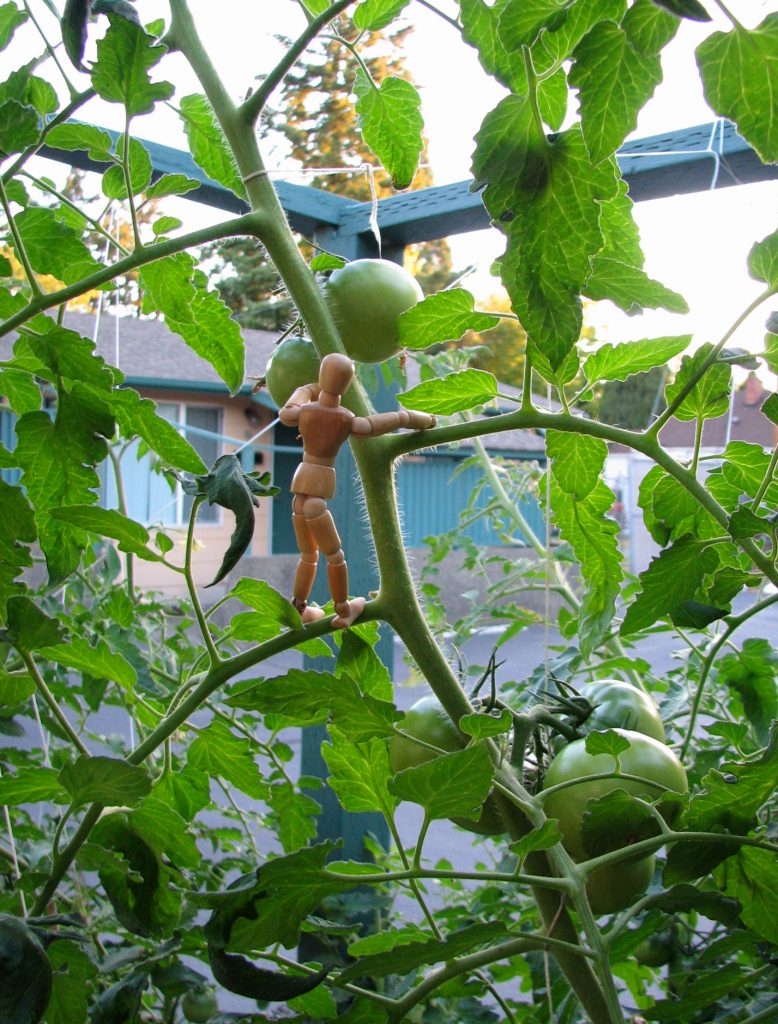
Growing Them Big – Submitted by Barry M.
Contest info:
Share your favorite photo of how you build good soil and help plants thrive by entering the 2018 Loop landscapes photo contest. Winners will receive a coupon for FREE bags of GroCo compost made with Loop, and even a Loop hat.
The 2018 Loop landscapes photo contest has 5 categories with prizes awarded for the top 3 photos in each category. Prize winning photos will be featured on our website.
- Mesmerizing macro – the little things you don’t notice with the naked eye
- Soil and seedlings – rich soil, new garden beds and the first signs of spring
- Flourishing fauna – from furry friends to buzzing bees
- Lush landscapes – spaces – from the smallest container garden to endless fields
- Plants and people – the human element
Contest Instructions
Deadline March 15th, 2018
Send the following to loop@kingcounty.gov OR ashley.mihle@kingcounty.gov
- Photo and caption
- Category
- Name
- Email or contact info
Follow Along
By entering a photo, you agree to:
Consent to and authorize use and reproduction of all photographs and video taken of me for purposes of World Wide Web internet pages, publication, display, video presentations, and advertising for King County. I understand that all digital files, negatives, positives, prints and transparencies will be King County’s property and can be used and reproduced without compensation to me. King County’s photographs are in public domain and cannot be copyrighted or used commercially.
I hereby release and discharge King County from any and all claims and demands arising out of or in connection with the use of the photographs and text, including any and all claims for libel.
Doing our part to fight climate change as a Utility of the Future
October 5th, 2017
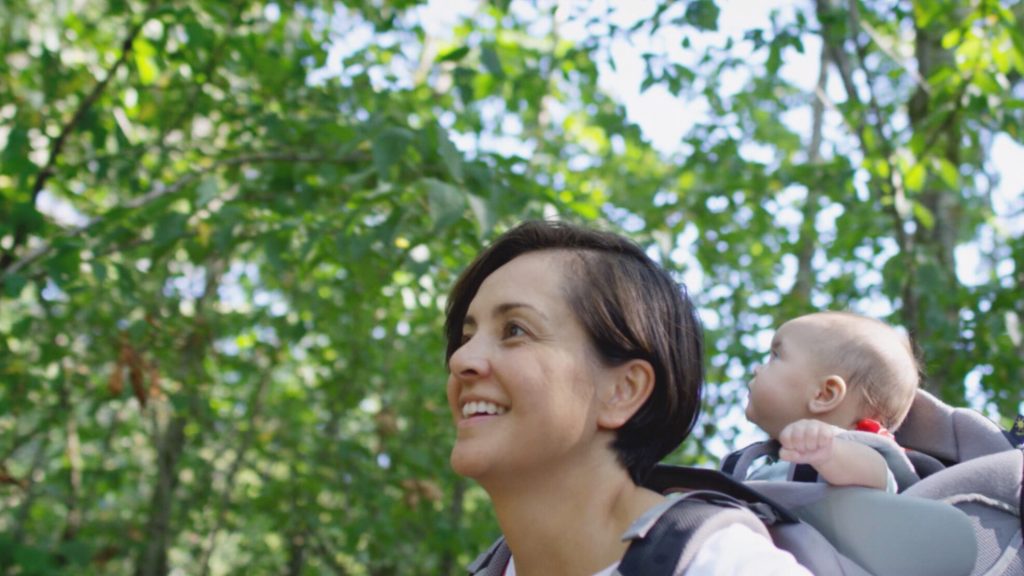
When confronted with big problems – problems that have no easy solution – we might feel overwhelmed. Climate change can make some of us feel that way. But every action helps, whether it is small or big. There are things you can do and there are things we as your utility can do.
Where are those trucks going?
August 31st, 2017
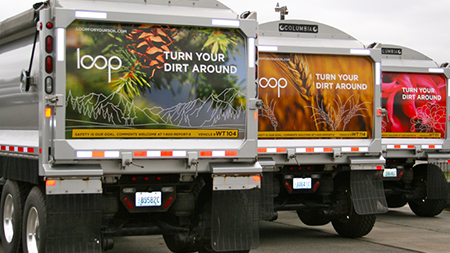
If you drive or live along Interstate-90, you’ve probably seen this truck on the road. You have probably wondered what it is carrying, and where it might be going.
Each one of these trucks carries about 31 tons of an endlessly renewable resource that returns valuable nutrients back to the soil. Loop® is a fertilizer-like product recycled from the waste that we send down drains and toilets.
While a small amount of Loop biosolids is turned into a garden product called GroCo compost, most Loop trucks are headed to farms and forests. Farmers and foresters have used Loop for decades to grow healthy crops and trees. Every day of the year, 10-15 trucks travel to approved sites across the region. As long as people in King County use those drains and toilets, we will find beneficial uses for recycled resources.
CitySoil Farm hosts a special group of summer campers
August 14th, 2017
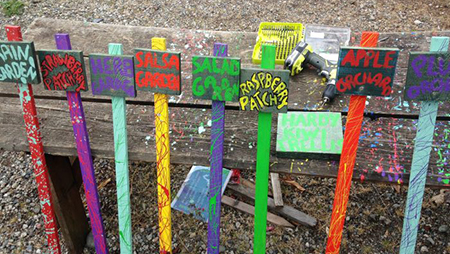
Summer camp season is upon us, and what a different experience it is today! Camp has expanded beyond canoeing, s’mores, and campfire songs. King County campers dive into sports, performing arts, outdoor education, and a wealth of other activities.
King County hosted a special group of campers who are becoming immersed in a new life and a new country. A group of thirty-four children from World Relief Summer Camp visited CitySoil Farm, located at South Treatment Plant in Renton. There, they learned about wastewater treatment and sustainable urban agriculture, while helping other families in need.
The poop Loop scoop: How King County recycles waste and water
August 4th, 2017
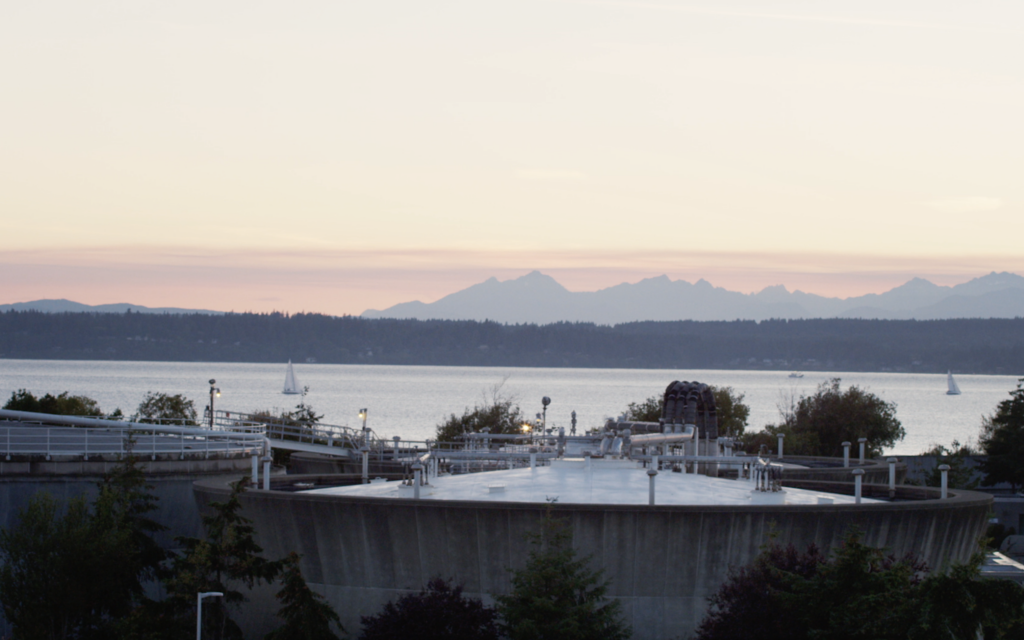
Public Health Seattle & King County gives the scoop on Loop, an endlessly renewable resource that helps us in the fight against climate change. Dr. Rodgers, a local public health expert, explains how the advances of engineering technology harness nature’s cleaning powers and recover valuable resources: Loop® biosolids, biogas, and recycled water. Unlike synthetic fertilizer, or even manure, Loop is held to stringent environmental regulations. Engineering and technology allows us to test and monitor the entire process, which keeps our communities safe and healthy.
King County employees share the value of recycling
July 12th, 2017
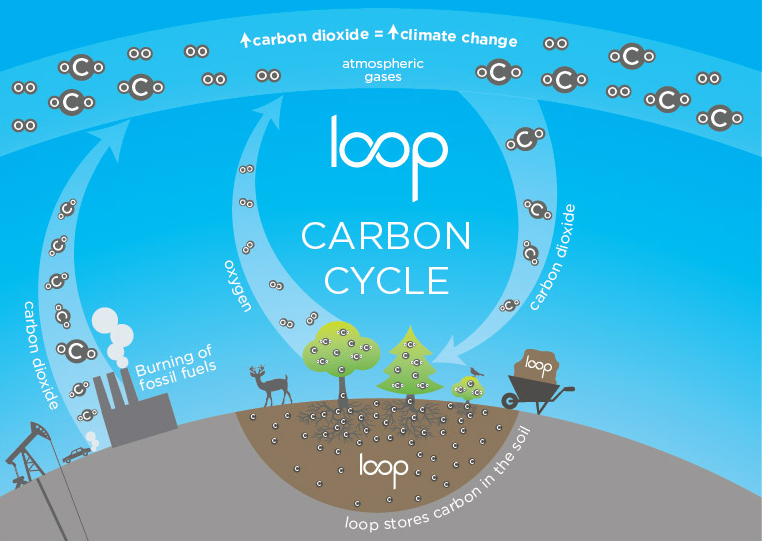
People who work at King County Wastewater Treatment Division (WTD) are committed to a healthy future for our region. We invest in recycling as part of our work – just as people do at home. We turn waste into resources that help protect our environment and climate change.
Our employees bring vast personal and work experience to this commitment. Here are three people who developed their commitment to recycling resources from their experiences living and working outside the United States.
CitySoil Farm grows healthy food and community
June 9th, 2017
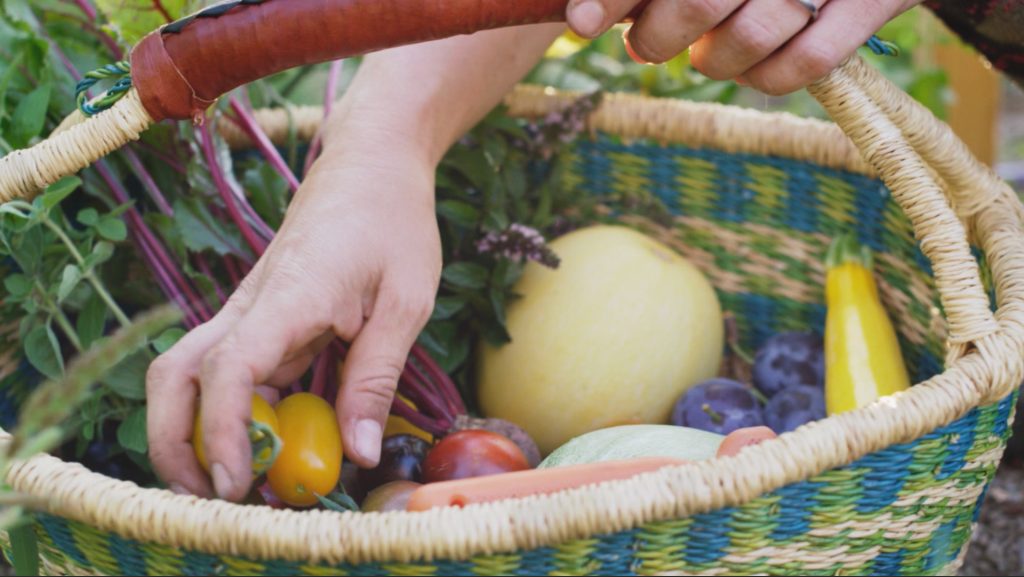
CitySoil Farm is all about partnerships. King County, King Conservation District (KCD), Tilth Alliance, and DIRT Corps joined to create this unique 1.5 acre demonstration garden. Located at King County’s South Treatment Plant in Renton, CitySoil has transformed an unused area of the grounds into a teaching farm. CitySoil partners envision a future where education leads to sustainable food systems in urban areas.
Partnerships also help CitySoil deliver healthy food to people who need it. In 2016, CitySoil delivered 3,100 pounds of fresh produce to the White Center Food Bank. These deliveries included culturally specific foods requested by the food bank.
CitySoil Farm Grows a New Generation of Gardeners
April 20th, 2017
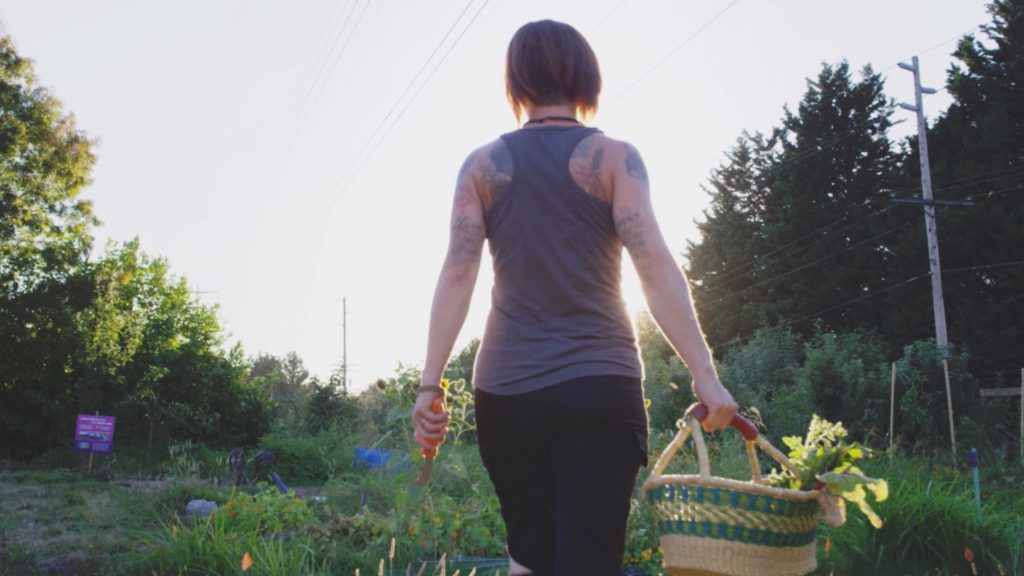
Fedora Williams carries on her family’s farming tradition in a whole new way.
As an immigrant to the United States in the late 1870’s, her great-great-grandfather began a living land trust with a small plot of land in Kansas. A fourth generation farmer, Williams remembers a childhood of school, chores, and more chores: feeding animals, chopping wood, harvesting the garden for dinner.
Today, Fedora Williams works for King Conservation District on a unique 1.5-acre farm site located at King County’s South Treatment Plant in Renton.
Building a Resilient Foundation for Boulder Park Farms
September 10th, 2016
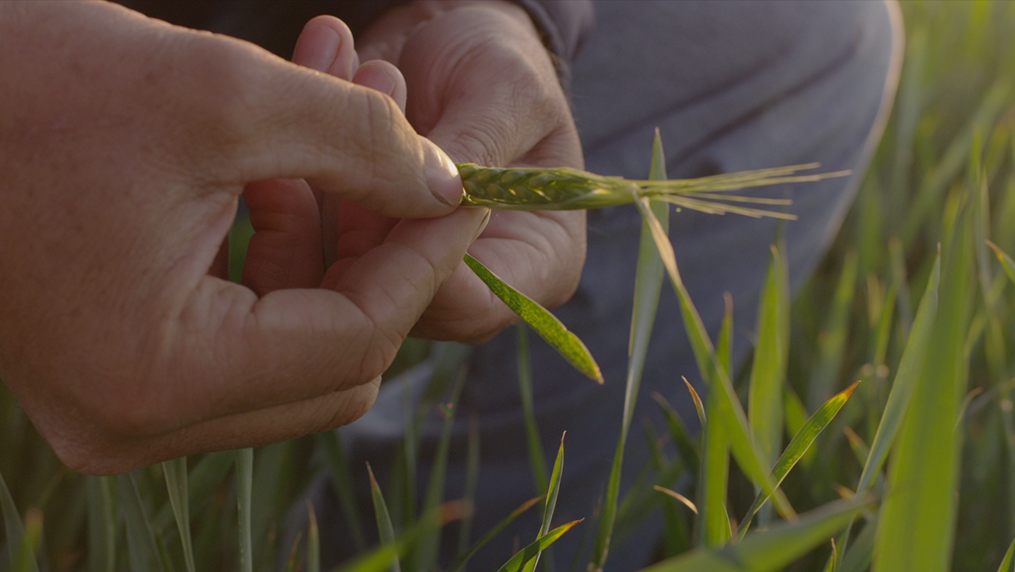
It’s just past Labor Day. The Harvest Moon will rise in a couple days. That means harvest time is over in Eastern Washington. Grain stalks that once glowed golden against blue skies have fallen. During harvest, giant combine harvesters crawl across fields, reaping, thrashing and winnowing as they travel. The grain that pours into a waiting truck means that our food cycle continues to turn.
Here at Boulder Park, farmers work in challenging conditions to build and conserve the foundation of their livelihoods, the soil.
How Many T. Rex Dinosaurs Can a Loop® Truck Carry?
August 9th, 2016
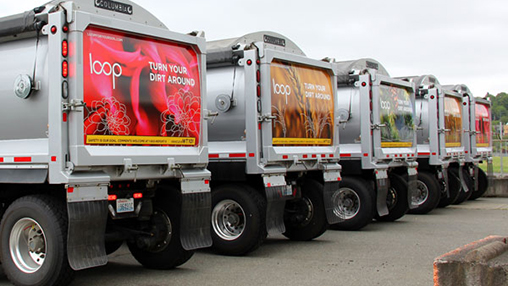
King County Wastewater Treatment Division takes public outreach seriously, but we like to have a little fun working with people- especially little people. We meet people where they’re at to tell them how our projects and services support their communities and their values.
On July 30, the Loop Biosolids Program brought a Loop Truck to the City of Tukwila Safety and Emergency Preparedness Fair Touch-A-Truck held at Westfield Mall.
A Garden Nourished with GroCo Beats a Cage in a Closet
July 28th, 2016
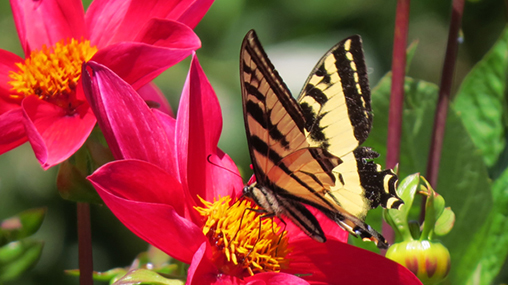
I was one of those kids who are nuts about animals. You know who I’m talking about. The kid who finally got her own room in a city apartment and then spent dog-walking money on hamster cages. I raised rodents in my closet until the smell gave away my expanding breeding operation.
Now I’m all grown up and I can host animals in my gardens instead of my closet. I plant for our local wildlife and stand back to enjoy the show.
This year, I picked up a free pickup load of GroCo compost at the World Water Day event at Brightwater Center. It’s my first time using GroCo.
GroCo Helps Your Garden Grow
July 27th, 2016
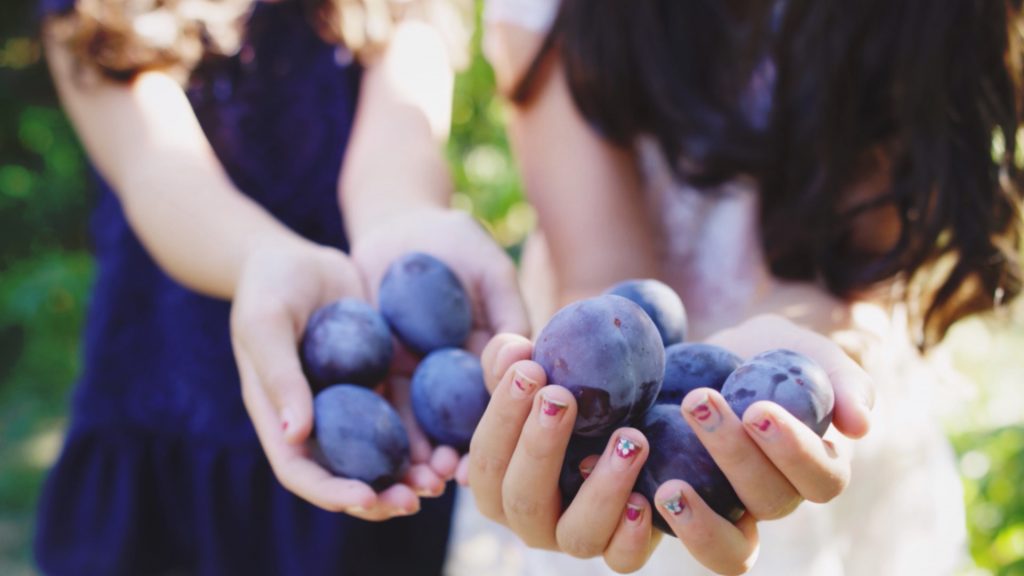
Even Mary, who we hear is quite contrary, knows how to make her garden grow – with the nutrient-rich power of GroCo compost made with Loop biosolids.
But don’t take it from us; let a local gardener tell you how GroCo turned an average meal into a locally-sourced and sustainable farm-to-table dinner party.




























